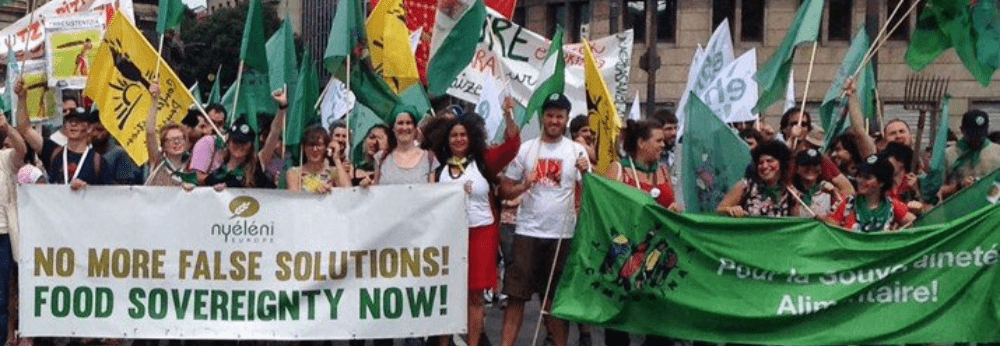Calling for True Food Systems Change: Social movements and Indigenous Peoples challenge the UN Food Systems Summit+2

ROME, ITALY – Social movements, farmers, and Indigenous communities are once again mobilizing in response to the United Nations’ controversial approach to tackling world hunger and unsustainable food production.
The controversy surrounding next month’s UN Food Systems Summit+2 began two years ago, when it sparked a global outcry due to the escalating influence of corporations and their proxy organizations in decision-making spaces – within the Summit and across organizing UN agencies.
In response, peasants, small-scale food producers, Indigenous and social movements led an unprecedented counter-mobilization and protest against the UNFSS. The concern was – and remains – that the Summit is set to advance the corporate agenda of industrial agriculture, rather than address the systemic issues at hand.
On July 24-26, the UN Secretary General is convening the UNFSS Stocktaking Moment (UNFSS+2) in Rome. However, the hundreds of grassroots groups that form the Peoples’ Autonomous Response to the UNFSS are denouncing the multi-stakeholderism governance model and the way it further entrenches corporate influence in the UN.
“The UNFSS was strongly influenced by large corporate structures and philanthropic groups like the World Economic Forum and the Bill and Melinda Gates Foundation, which advocate solutions favoring big data, finance, and corporate agri-tech. Key arms of the UNFSS such as the World Business Council for Sustainable Development, pushes a narrative that environmental solutions should be profitable, favoring its member multinationals like Bayer and Nestle and sidelining existing multilateral, rights-based food governance spaces such as the United Nations Committee on World Food Security (CFS).” — Civil Society and Indigenous Peoples’ Mechanism for relations with the UN Committee on World Food Security (CSIPM)
Ahead of the UNFSS+2, speakers from the Civil Society and Indigenous Peoples’ Mechanism (CSIPM) will hold a virtual press conference, to call for an urgent transformation of food systems. They call for shifting away from corporate-driven industrial models, towards diverse, agroecological, community-led food systems that prioritize the needs and rights of those most affected by the hunger, climate and health crises.
With an estimated 258 million people facing acute food insecurity today, the UN Secretary General, António Guterres says, “This crisis demands fundamental, systemic change.” Yet, the UNFSS+2 threatens to cement corporate-friendly food pathways – down the road of business as usual, instead of changing direction.
“In this new moment of increasing hunger and systemic global food crisis, the UN is at the crossroads: A further consolidation of corporate-driven industrial food systems, or a human rights-based transformation towards agroecology and food sovereignty.” — CSIPM.
There is abundant evidence, including from the UN’s own FAO agency on the success of agroecology and its ability to address both hunger and ecological crises. Through diverse, cultural and Indigenous practices – the world’s food producers are actively building our food future that transcends corporate/market dependencies. This approach tackles hunger, guarantees livelihoods, protects ecosystems, and creates community resilience to environmental and market crises.
PRESS BRIEFING | Monday 17th of July 2023, 9AM New York / 3PM Rome
At this press conference, global food systems leaders will unpack:
- How UN leaders encourage corporations to help shape the agenda and solutions in the UN
- How does this Summit threaten to further consolidate corporate control over food?
- What are the failures of industrial food chains?
- What are effective policy solutions to the global food crisis?
- How can global food governance better support the world’s food producers?
Speakers will include CSIPM representatives and allies:
- Moderated by: Shalmali Guttal – Executive Director of Focus on the Global South
- Perla Álvarez – Member of the National Coordination for the Organization of Women workers, Rural and Indigenous Women (CONAMURI Paraguay) and La Vía Campesina
- Ibrahima Coulibaly, President of the Western Africa Peasants and Farmers’ Network ROPPA
- Saúl Vicente – Member of the International Indian Treaty Council
- Patti Naylor – Farmer and member of the National Family Farm Coalition, La Via Campesina
Also read:
A Summit Under Siege | Corporate control of 2021 UN Food Summit endangers food sovereignty!
The UN Food Systems Summit is hogwash. It is a threat to peoples’ food sovereignty
Food Sovereignty: Resisting Corporate Capture of our Food Systems | Nyéléni Newsletter
This post is also available in Español.
